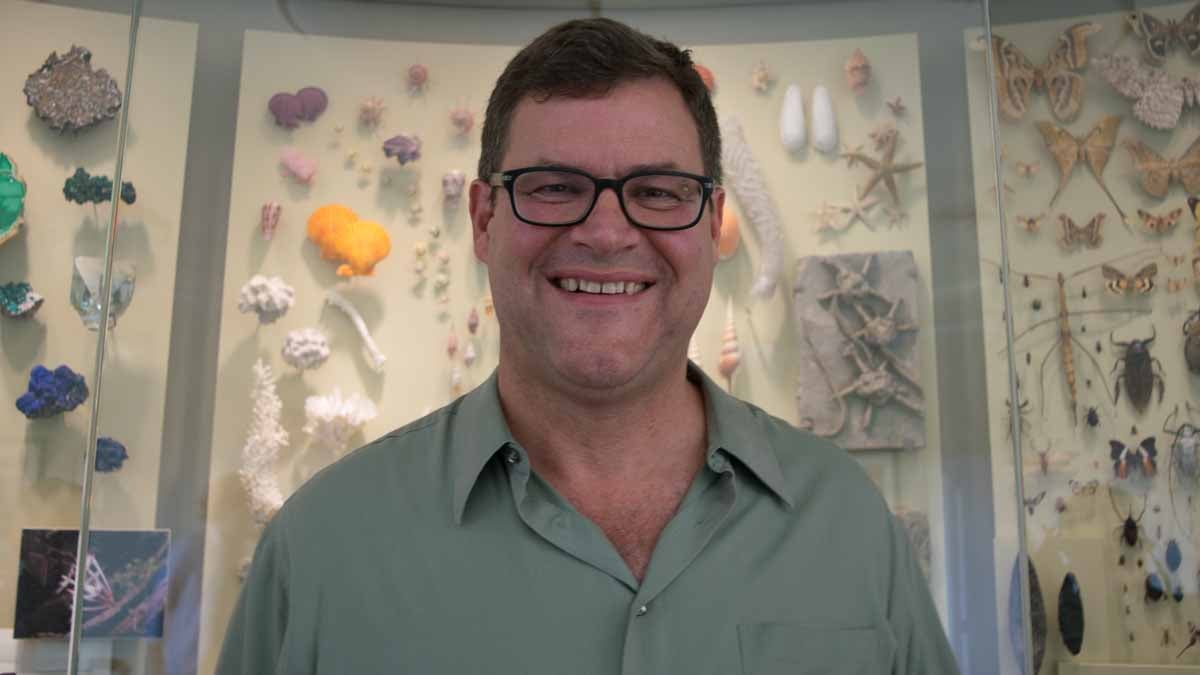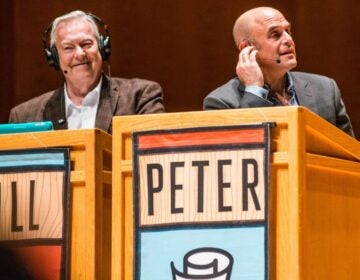It’s ‘game on’ for the man in charge of 145 million specimens
Listen 9:47
Kirk Johnson, the director of the Smithsonian's National Museum of Natural History, in front of a display case in his office. (Paige Pfleger/WHYY)
It seems that Kirk Johnson was training from a very early age to one day head the country’s largest and most comprehensive natural history collection. “There’s evidence that I was born a museum kid,” he joked. “There’s a picture of me in diapers at a geology talk at Mount Rainier.”
This piece is a part of our show on Natural History Museums. Take a look at the rest of our stories here.
It seems that Kirk Johnson was training from a very early age to one day head the country’s largest and most comprehensive natural history collection. “There’s evidence that I was born a museum kid,” he joked. “There’s a picture of me in diapers at a geology talk at Mount Rainier.”
His bright office in the Smithsonian National Museum of Natural History is spacious, and beautifully decorated with display cases of butterfly specimens and gems.
When he was five years old, he found his first fossil, and it was “game on” for the boy who traveled a lot with his parents – from their home to ranch country in Wyoming, the Rockies, and California.
He loved looking for and finding special things, and the museums where such items would be displayed. “It’s never been game off for me.” Johnson’s excitement and passion for his work is evident, so is his sense of humor; one of the display cases in his office contains rocks and gems, and a few plastic toy dinosaurs wandering around. Johnson is a big guy. Tall, with broad shoulders and a voice that carries well, he beams when he talks about the excitement of going on digs, of finding amazing things, and sometimes missing them.
“I dug a hole in Alberta, and I kept digging and digging, we found a whole bunch of beautiful fossil leaves, and then we stopped,” he recalled about one such excursion. “Then later, I got a phone call from the locals, they went back in the hole, and encountered a complete dinosaur skeleton. I stopped digging just a little bit too soon.” Johnson seems to take missing out in stride, though. “That’s why we look, why discovery is so cool, you never know what you’ll find.”
Johnson says natural history museums like the one he leads have three roles; they research and study the natural world, they create and maintain collections, and they share their collections and findings with the public.
When he looks to the future of his organization, he sees both, immense potential and challenges.
“I think lot about the future of natural history museums,” he said. “They are largely a creation of 19th century, before we had TV, before mass travel.” Johnson said these museums showcased beautiful specimens that most people would never see anywhere else, and preserved the memory of things that didn’t exist anymore. “The museum I worked at in Denver, the first item they put on display was the last wild caught bison in Colorado, they shot it and put it into a museum.”
Johnson says natural history museums are the memory of our culture, but they also play a big role in preserving our future. Fossils can help make predictions about climate change. Mosquito collections can help in combatting the spread of the Zika virus. If a food crop is damaged, wiped out, and lost to farming, old plant specimens could be used to bring it back. “In ways, these museums are also an insurance package,” said Johnson.
He worries though, because across the country, natural history museums are struggling and losing their scientists.
“The big challenge is that these museums are perceived as old dusty places where nothing happens, when we are in fact about the future, and very exciting.” He says a lot of people receive them as a place to entertain the kids. “And they don’t see past the dinosaurs.”
He says museums need to do more to bring everything that happens behind the scenes, in the collections, to the attention of the public.
“We need to share what we know – this is the planet’s memory and it tells us a lot about the planet’s future.”
WHYY is your source for fact-based, in-depth journalism and information. As a nonprofit organization, we rely on financial support from readers like you. Please give today.






